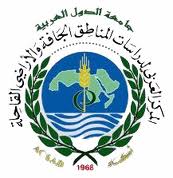
DAMASCUS, (ST) – The Arab Center for the Studies of Arid Zones and Dry Areas ( ACSAD) in cooperation with the Ministry of Agriculture carry out several agricultural projects in Syria.
Some projects achieved real strides in implementation and some faced difficulties and obstacles result in terrorist armed groups that led to the delay of some stages in implementation. The projects work on alleviating rural poverty and drought in the governorates of Deir Ezzor, Idlib and Raqqa.
The projects work to improve the level of targeted families living through the implementation of activities that would support income in the domains of livestock, agriculture, provide models for supporting activities for the sustainability of animal production projects and marketing animal products, according to a recent report issued by ACSAD.
” The results of the field survey, targeted some villages in Raqqa, Hasaka and Deir al-Zour to a questionnaire about the condition of breeders and farmers in the region hit by drought in recent years, emphasizes the need to provide technical support in the areas of breeding sheep and goats in terms of herd management, fattening and training of technicals in the region, the establishment of units to chop agricultural residues and waste of food industry and its treatment to improve the food value, preparing it for marketing as fodder, making a suitable feed plan for sheep flocks using agricultural residues, creating units to pasteurize milk and improve methods of marketing milk from grazing areas to the cities and the application of suitable health care systems for roaming herds and implementing training courses for veterinary cadres in the region” the report clarified.
The report confirms that the project helped creating job opportunities for local people to enable them to cover their daily needs, reducing migration and giving examples of pioneering projects to help the sustainability of livestock production in the region.
The report indicates that the center of ACSAD began in 2011 implementing an evaluation project and the election of new varieties of palms and identifying strains of palm seeds with good quality in Syria, Egypt and Saudi Arabia expected to be completed in 2014, where the project aims to choose and classify the distinct breeds and setting up hereditary complexes to make an evaluation of distinguished seeds.
Experts working in the project expect to get new varieties of palm, propagation of these sorts, spreading its cultivation, setting up genetic complexes to carry out studies and experiments.
ACSAD has operated since 2007 on a project to use artificial insemination and embryo transfer for the development of Arabian horses in Syria, which is scheduled to be completed in 2016 in order to develop educational programs to maintain genetic unique traits to Arab horses, especially the Syrian , in addition to the training and developing of technical personnel in the areas of transport and use of modern technologies in the horse breeding and care.
The report shows that the project of using of salt and brackish water in agriculture, which is implemented in the ACSAD Station for Research in Deir ez-Zor, since the founding of the center, is still standing, explaining that the project is working on the study of the potential impacts from the use of non-conventional water in irrigation on soil and plant and study the cumulative effect of salts on soil, vegetation and finding a new and traditional supporter of water.
ACSAD also performs a project on the use of treated water in the afforestation in cooperation with the Ministry of Agriculture, which is scheduled for completion next year to study the possibility of using treated water in the afforestation to reduce the depletion of fresh water to irrigate plants and finding an alternative water resource for this purpose and ensure fresh water for the purposes of household and the preservation of the environment and reduce climate impacts.
ACSAD also in cooperation with the International Institute for Plant Nutrition implements a project to study the impact of overlap between the major elements of fertilizers in feeding crops in Deir al-Zour , al Ghab Plain and Izraa.
The project started in 2009 and ends 2015 in order to study the effect of the mutual act between fertilization at different levels in the production of wheat, maize in quality and quantity, improve the fertility of soil, the rational use of fertilizers to reach the best economic production and reducing of environmental pollution.
The report reveals that the workers on the project used the nutrients elements fertilizers in a balanced way at different levels to maintain the fertility of soil and increase productivity. The workers on the project expected for response to wheat produced in the Arab Center for mutual reaction between the used mineral fertilizers that leads to the increase in production.
Sh. KH

